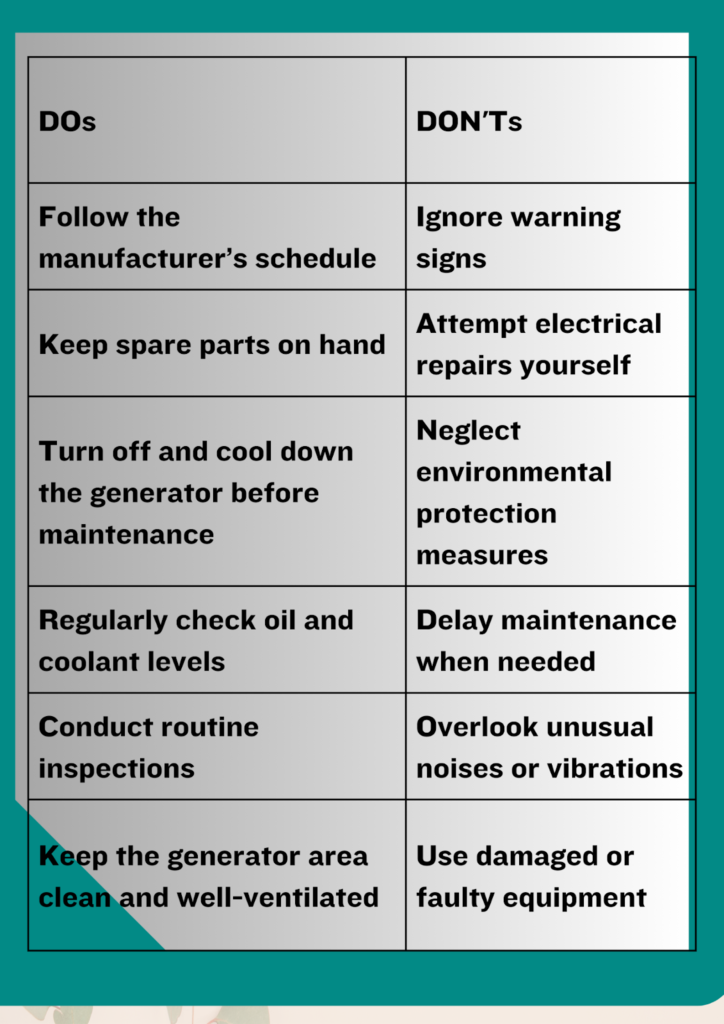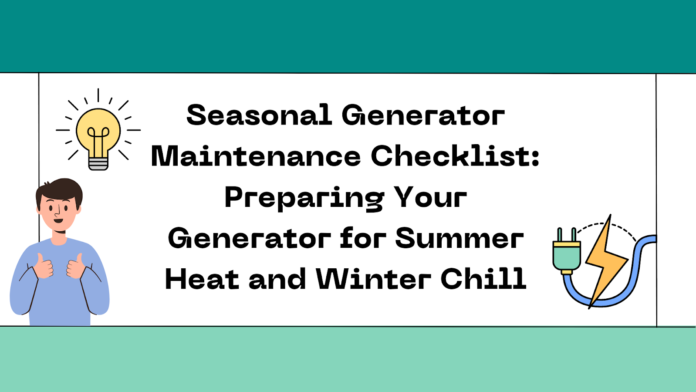Last Updated on May 29, 2025 by Rida Hamid
When extreme weather strikes, a reliable generator can be a lifesaver, keeping your lights on, your home warm (or cool), and your essential appliances running. However, without proper seasonal maintenance, your generator may fail when you need it most.
In fact, a staggering 40% of generator failures occur during extreme weather events due to lack of seasonal maintenance. As a generator owner, it’s crucial to take proactive steps to ensure your unit is ready to power through any challenge nature throws your way.
This comprehensive guide aims to help enhance your generator’s performance and extend its lifespan through diligent care. By following the seasonal checklists and best practices outlined here, you’ll ensure your generator can handle summer heat waves and winter chills without a hitch.
Table of Contents
Summer Maintenance Checklist
As temperatures soar, your generator faces greater strain from increased demand and challenging operating conditions. Neglecting summer maintenance can lead to overheating, inefficient fuel consumption, and even complete breakdowns. To keep your generator running smoothly during the sweltering months, follow these essential steps:
Cooling System Check
A clogged or malfunctioning cooling system is a surefire way to overheat your generator during scorching summer days. Inspect and clean the radiator fins, hoses, and fan blades to ensure optimal airflow and heat dissipation.
This simple task can prevent costly repairs and downtime caused by overheating. A well-maintained cooling system is crucial for preventing overheating, which is one of the most common causes of summer generator failures.
Air Filter Replacement
Clogged air filters can reduce your generator’s efficiency by a staggering 30%. This not only wastes fuel but also increases the risk of overheating and damage. Clean or replace the air filters regularly to allow proper airflow and prevent unnecessary strain on your generator.
As a generator owner, it’s essential to keep a stock of spare air filters on hand. This way, you can quickly replace them without delays, ensuring your generator is always operating at peak efficiency.
Battery Maintenance
Extreme heat can wreak havoc on your generator’s battery, causing premature failure and starting issues. Check the battery’s health regularly, clean the terminals, and secure the connections to ensure reliable starting and operation throughout the summer months.
If your battery is nearing the end of its lifespan, consider replacing it before the summer heat sets in. This proactive step can save you from the inconvenience of a dead battery during a power outage.
Fuel System Inspection
Summer heat can cause fuel degradation and clogged injectors, leading to inefficient operation and potential breakdowns. Clean the injectors and check for any leaks in the fuel system to ensure efficient operation and prevent fire hazards.
It’s also essential to use high-quality fuel and follow the manufacturer’s recommendations for fuel storage and handling. Contaminated or stale fuel can cause significant damage to your generator’s engine.
Electrical System Review
Loose connections and corrosion can lead to electrical malfunctions and potential safety hazards. Inspect and tighten all electrical connections, and clean any corroded components to ensure a safe and reliable power supply.
In the U.S., particularly in areas like Colorado Springs, generators face challenges due to extreme weather conditions, ranging from heavy snowfall to thunderstorms, which can cause wear and tear in the electrical systems. Addressing these issues promptly with the assistance of a professional generator repair technician ensures safety and prevents further damage. A skilled expert can offer tailored solutions, significantly enhancing your generator’s efficiency and reliability. For residents experiencing issues, seeking generator repair Colorado Springs CO provides access to local professionals equipped to handle your generator’s specific needs, ensuring peace of mind during weather extremes.
Winter Preparation Checklist
As the chill sets in, your generator faces a new set of challenges. Proper winter preparation is essential to avoid frozen components, starting issues, and potential breakdowns. Follow these steps to winterize your generator and ensure it’s ready to power through the coldest months:
Antifreeze Level and Quality
Frozen coolant can cause catastrophic damage to your generator’s engine. Check the antifreeze level and quality, and top up or replace as needed to prevent freezing in the cooling system. It’s also a good idea to use a coolant tester to ensure the antifreeze concentration is adequate for the expected winter temperatures in your area.
Heating System Inspection
A faulty heating system can leave your generator struggling to start and operate in freezing temperatures. Inspect and test the heating elements to ensure they’re functioning correctly. If you notice any issues, don’t hesitate to seek professional assistance from a reputable generator service and repair company.
Winter generator failures are caused by improper battery maintenance and cold weather starting issues, a representative from Generator Service and Repair. Winterizing your generator is crucial for reliable operation when you need it most.
Oil and Lubrication
Cold temperatures can thicken and solidify regular engine oil, leading to increased wear and potential engine damage. Consider switching to a winter-grade oil and lubricating all moving parts to ensure smooth operation during the colder months.
It’s also essential to check the generator’s oil level regularly and top it up as needed. Running your generator with low oil levels can cause irreparable damage and costly repairs.
Storage and Shelter
Protect your generator from the elements by providing proper storage or shelter. Snow and ice buildup can cause damage and hinder access when you need it most. If possible, store your generator in a dry, well-ventilated area, or invest in a weatherproof enclosure to keep it safe from the harsh winter conditions.
Startup and Operational Test
Once you’ve completed your winter preparation, it’s essential to test your generator’s startup and operation in cold temperatures. This will help identify any potential issues before they become critical problems, ensuring your generator is ready to power your home or business when you need it most.
Year-Round Maintenance Tips
While seasonal checklists are crucial, year-round maintenance is equally important for extending your generator’s lifespan and ensuring optimal performance. Follow these tips to keep your generator in top shape all year round:
Regular Cleaning
Keeping your generator and its surrounding area clean and free from debris is essential for proper airflow, cooling, and safe operation. Establish a regular cleaning routine to prevent buildup and potential hazards. This simple task can go a long way in prolonging your generator’s life and ensuring reliable performance.
Routine Inspection and Testing
Conduct monthly inspections and tests to identify any potential issues early on. This can include checking fluid levels, inspecting belts and hoses, and running the generator under load to ensure proper operation.
Regular inspections and testing can catch minor issues before they escalate into major problems. It’s a small investment that can save you from costly repairs or replacements down the line.
Professional Inspection
While routine maintenance is essential, an annual professional inspection is highly recommended. Trained technicians can identify potential issues you may have missed and perform comprehensive checks to ensure your generator is in optimal condition.
During these inspections, the technicians will thoroughly examine all components, including the engine, electrical system, and fuel system, and make any necessary adjustments or repairs. This proactive approach can help you avoid unexpected breakdowns and extend the lifespan of your generator.
DOs and DON’Ts of Generator Maintenance

To ensure your generator’s longevity and safe operation, follow these essential DOs and DON’Ts:
DOs
- Do follow the manufacturer’s maintenance schedule: Each generator model has specific maintenance requirements. Adhering to the recommended schedule is crucial for optimal performance and longevity.
- Do keep spare parts on hand: Having spare parts like air filters and spark plugs readily available can make replacements quick and easy, minimizing downtime.
- Do ensure the generator is turned off and cooled down: Safety should always be a top priority. Never perform maintenance on a running or hot generator.
DON’Ts
- Don’t ignore warning signs: Unusual noises, difficulty starting, or power fluctuations can indicate underlying issues that require prompt attention. Ignoring these warning signs can lead to more severe problems and costly repairs.
- Don’t attempt to repair electrical issues yourself: Unless you’re a trained professional, attempting to repair electrical components can be extremely dangerous. Always consult a qualified generator repair technician for electrical issues.
- Don’t neglect environmental protection measures: Proper disposal of old oil, batteries, and other hazardous materials is essential for protecting the environment and adhering to local regulations.
Frequently Asked Questions (FAQs)
It’s recommended to perform monthly checks and inspections, as well as follow the manufacturer’s recommended maintenance schedule for more comprehensive services. Regular maintenance is crucial for ensuring your generator’s reliability and longevity.
Many routine maintenance tasks, such as cleaning, checking fluid levels, and replacing air filters, can be performed by owners with some mechanical knowledge. However, for more complex repairs or annual inspections, it’s best to consult a professional generator repair service for their expertise and specialized tools.
If your generator is experiencing difficulty starting, emitting unusual noises or vibrations, or exhibiting power fluctuations or surges, these could be signs of underlying issues that require immediate attention. Don’t ignore these warning signs, as they could lead to more severe problems or potential safety hazards.
Conclusion
Proper seasonal maintenance is crucial for ensuring your generator’s reliability and longevity, especially during extreme weather conditions. By following the checklists and best practices outlined in this guide, you can enhance your generator’s performance, prevent costly breakdowns, and extend its lifespan.
Remember, while routine maintenance tasks can be performed by owners, it’s always advisable to seek professional assistance from qualified generator repair services for complex repairs or annual inspections. Investing in regular maintenance can save you from the inconvenience and potential dangers of a generator failure when you need it most.
Don’t wait until it’s too late. Take action today and prioritize seasonal generator maintenance for peace of mind and reliable power, no matter the weather. Contact your local generator service and repair professionals to schedule your generator’s tune-up and ensure it’s ready to power through summer heat waves and winter chills.
Apart from that if you want to know about “Shop the Right Generator : Your Backup Solution” then please visit our “Technology” Category.



























